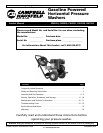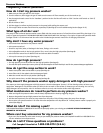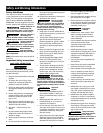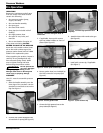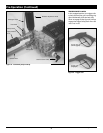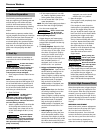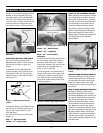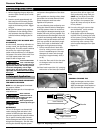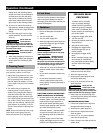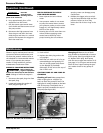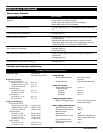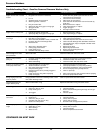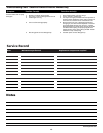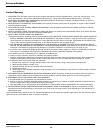
Pressure Washers
www.chpower.com
Troubleshooting Chart - Gasoline Powered Pressure Washers Only
Symptom Possible Cause(s) Corrective Action(s)
Engine will not start or is hard
to start
Engine misses or lacks power
Low pressure and/or pump
runs rough
Water leakage from under
pump manifold
Water in pump crankcase
(milky oil)
Frequent or premature failure
of the pump water seals
Strong surging at the inlet
and low pressure
Oil leakage between the
engine and the pump
Fluctuating pressure
Pressure drops after period of
normal use
Pump noisy / pump runs
rough
1. No gasoline in fuel tank or carburetor
2. Low oil
3. Start/Stop switch in stop position
4. Water in gasoline or old fuel
5. Dirty air cleaner filter
6. Spark plug dirty, wrong gap or wrong type
7. Spray gun closed
8. Other causes
1. Partially plugged air cleaner filter
2. Spark plug dirty, wrong gap or wrong type
1. Worn or wrong size tip
2. Inlet filter on pump clogged
3. Worn water seals, abrasives in water, or natural wear
4. Fouled or dirty inlet or discharge valves
5. Restricted inlet
6. Worn inlet or discharge valves
7. Leaking high pressure hose
8. Pump drawing in air
9. Unloader valve seat faulty or worn
Worn water seals
1. Humid air condensing inside crankcase
2. Oil seals leaking
3. Water seals leaking
1. Scored damaged or worn plungers
2. Abrasive material in the fluid
3. Inlet water temperature too high
4. Overpressurizing pump
5. Excessive pressure due to partially plugged or
damaged tip
6. Pump running too long without spraying
7. Pump running dry
Foreign particles in the inlet or discharge valve or worn
inlet and/or discharge valves
Worn oil seals and/or o-ring
1. Low engine oil
2. Valve worn, dirty or stuck
3. Pump drawing in air
4. Tip clogged
1. Worn pump water seals
2. Nozzle worn
3. Valve worn, dirty or stuck
4. Unloader valve seat worn or dirty
5. Nozzle in low PSI position
1. Pump drawing in air/low water supply
2. Valves dirty or worn
3. Worn bearings
4. Water too hot
1. Fill the tank with gasoline,open fuel shut off valve.
Check fuel line and carburetor
2. Check oil level. Fill if necessary
3. Move switch to start position
4. Drain fuel tank and carburetor. Use new fuel and dry
spark plug
5. Remove and clean or replace
6. Clean, adjust the gap, or replace
7. Trigger spray gun
8. See engine owner’s manual
1. Remove and clean or replace
2. Clean, adjust the gap, or replace
1. Replace with tip of proper size
2. Clean. Check more frequently
3. Check filter. Replace water seals. See service center
4. Clean inlet and discharge valve assemblies. Check filter
5. Check garden hose, may be collapsed or kinked. Check
inlet water flow
6. Replace worn valves
7. Replace high pressure hose
8. Ensure hoses and fittings are tight
9. Check and replace
Install new water seals. See service center
1. Change oil as specified in maintenance schedule
2. Install new oil seals. See service center
3. Install new water seals. See service center
1. Install new plungers. See service center
2. Install proper filtration on pump inlet plumbing
3. Check water temperature; may not exceed 100ºF
4. Do not modify any factory set adjustments
5. Clean or replace tip
6. Never run pump more than 2 minutes without spraying
7. Do not run pump without water
Clean or replace valves. See service center
Replace oil seals and/or o-ring. See service center
1. Add oil.
2. Check and replace
3. Ensure hoses and fittings are tight. Purge air from gar-
den hose
4. Check or replace
1. Check and replace
2. Check and replace
3. Check, clean or replace
4. Check, clean or replace
5. Pull back nozzle to high pressure position
1. Ensure fittings are tight. Increase water pressure
2. Check, clean or replace
3. Check and replace
4. Reduce temperature below 100ºF
12
CONTINUED ON NEXT PAGE



